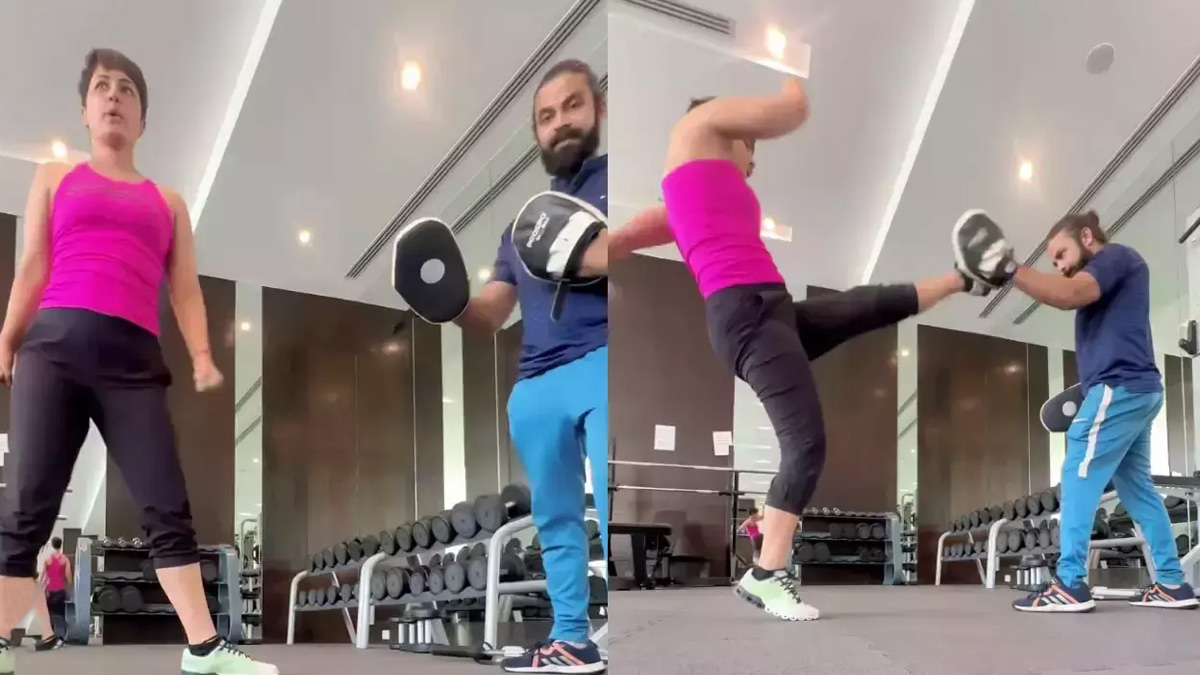
In an inspiring yet controversial display of resilience, Hina Khan recently shared a video on her Instagram where she was seen engaging in a vigorous kickboxing session. This post came just days after her breast cancer surgery and while she was still undergoing chemotherapy. Her accompanying caption read: “This journey should be remembered for what I made off it... not the other way around.” While her determination is undoubtedly commendable, it raises the question: Is such intense physical activity advisable for someone in her condition?
Table of Content:-
The Challenges of Exercising During Chemotherapy
Dr Shishir N. Shetty, Senior Consultant-Surgical Oncology, Fortis Hiranandani Hospital Vashi, provides insights into the challenges faced by cancer patients undergoing chemotherapy. Chemotherapy is a rigorous treatment that varies in frequency based on the patient's condition, typically administered every 2-3 weeks. One of the most common side effects is extreme fatigue, particularly pronounced on the days immediately following the treatment. This fatigue may slightly diminish after a week but rarely disappears entirely.
View this post on Instagram
Given these circumstances, engaging in heavy exercise like kickboxing seems incredibly taxing. The fact that Hina managed to perform such an intense workout speaks volumes about her strength and determination. However, it's essential to recognise that what she achieved might not be feasible or safe for every patient undergoing similar treatments.
Risks of Intensive Workouts During Cancer Treatment
The primary concern with high-intensity workouts during chemotherapy is the risk it poses to the patient's health. Chemotherapy not only causes fatigue but also significantly weakens the immune system, leaving the body more susceptible to infections. Engaging in strenuous exercise can exacerbate these issues, potentially leading to severe complications.
Also Read: Deepika Padukone Spills Tea On Indulging In Sweet Treats While Maintain Her Enviable Figure
Public places like gyms also present a higher risk of infection for chemotherapy patients. Dr Shetty emphasises the importance of listening to one's body and avoiding strenuous activities that might overextend one's physical capabilities. She advises patients to draw inspiration from Hina Khan's courage but cautions against emulating her specific actions without considering individual health conditions.

Hina Khan's Perspective
In her Instagram caption, Hina Khan acknowledged the personal nature of her journey and the importance of self-awareness. She wrote, “With all due respect to everyone who’s battling similar fights more or less... the idea is to know yourself, find your own way and listen to your body.” This sentiment underscores the importance of individualized approaches to cancer recovery and the need to respect one's physical limits.
Also Read: Janhvi Kapoor Hospitalized Due To Food Poisoning; Symptoms To Look Out For
Recommended Exercises for Cancer Patients
While high-intensity workouts might not be advisable, Dr Shetty suggests that cancer patients should not forfeit exercise altogether. Light physical activities can be beneficial in regaining strength and boosting immunity. Recommended exercises include:
- Yoga: Known for its gentle movements and focus on breathing, yoga can help improve flexibility, strength, and mental well-being.
- Light Standing Exercises: These can help maintain mobility and muscle tone without putting undue strain on the body.
- Light Cardio: Activities such as walking or slow-paced cycling can help improve cardiovascular health and overall stamina.
These exercises are designed to be low-impact, making them safer options for individuals undergoing chemotherapy. They also provide the added benefits of reducing stress and improving mood, which are crucial for overall recovery.
Bottomline
Hina Khan's post-surgery kickboxing video is undoubtedly inspiring, showcasing her resilience and determination. However, it also brings to light the critical need for cancer patients to carefully consider their physical limits during treatment. While it is essential to stay active, the type and intensity of exercise should be tailored to individual capabilities and medical advice.
Patients should always consult with their healthcare providers before starting any new exercise regimen, especially when undergoing treatments like chemotherapy. Ultimately, the goal is to find a balance that promotes health and recovery without risking further complications.
Also watch this video
How we keep this article up to date:
We work with experts and keep a close eye on the latest in health and wellness. Whenever there is a new research or helpful information, we update our articles with accurate and useful advice.
Current Version